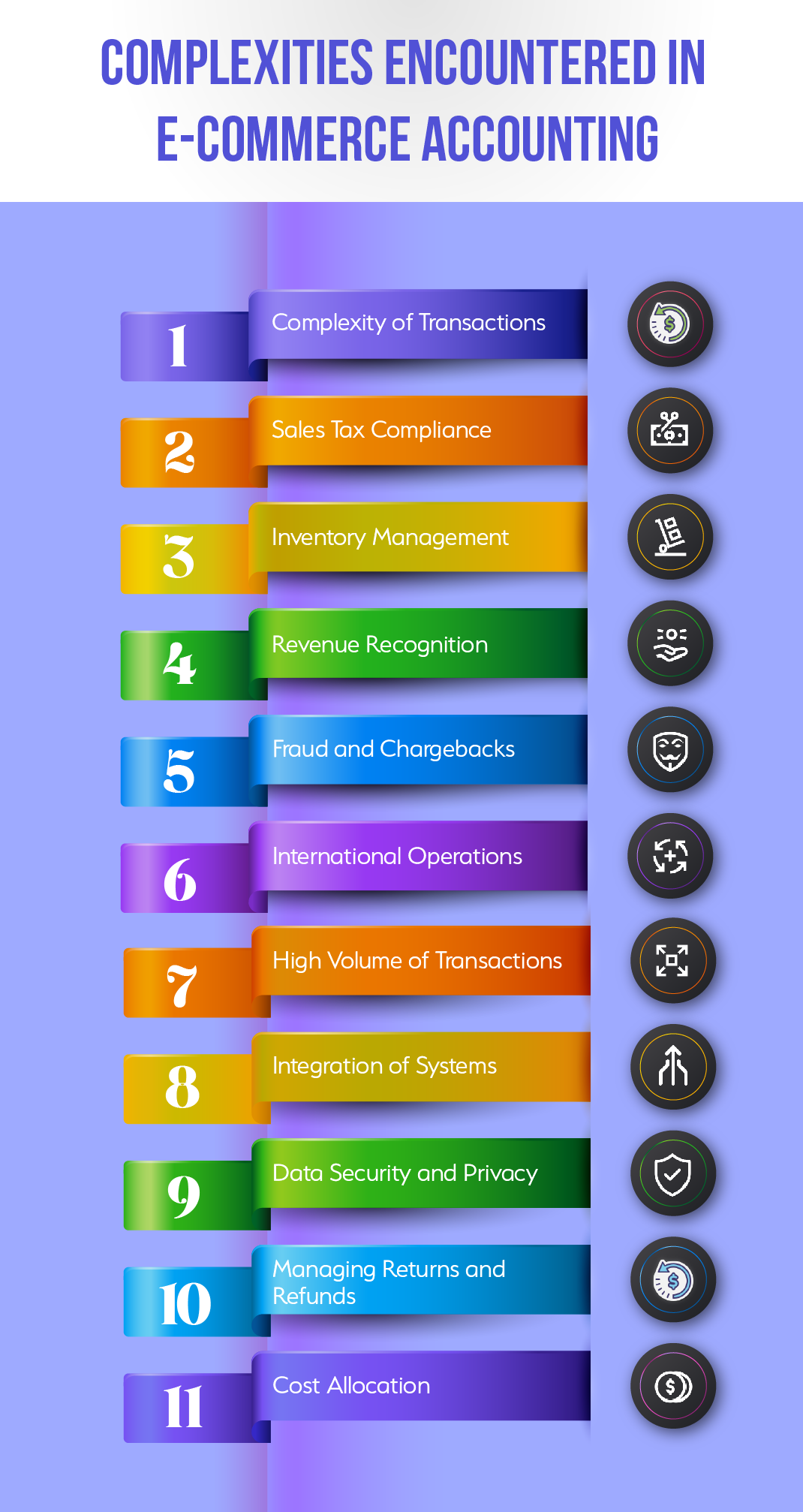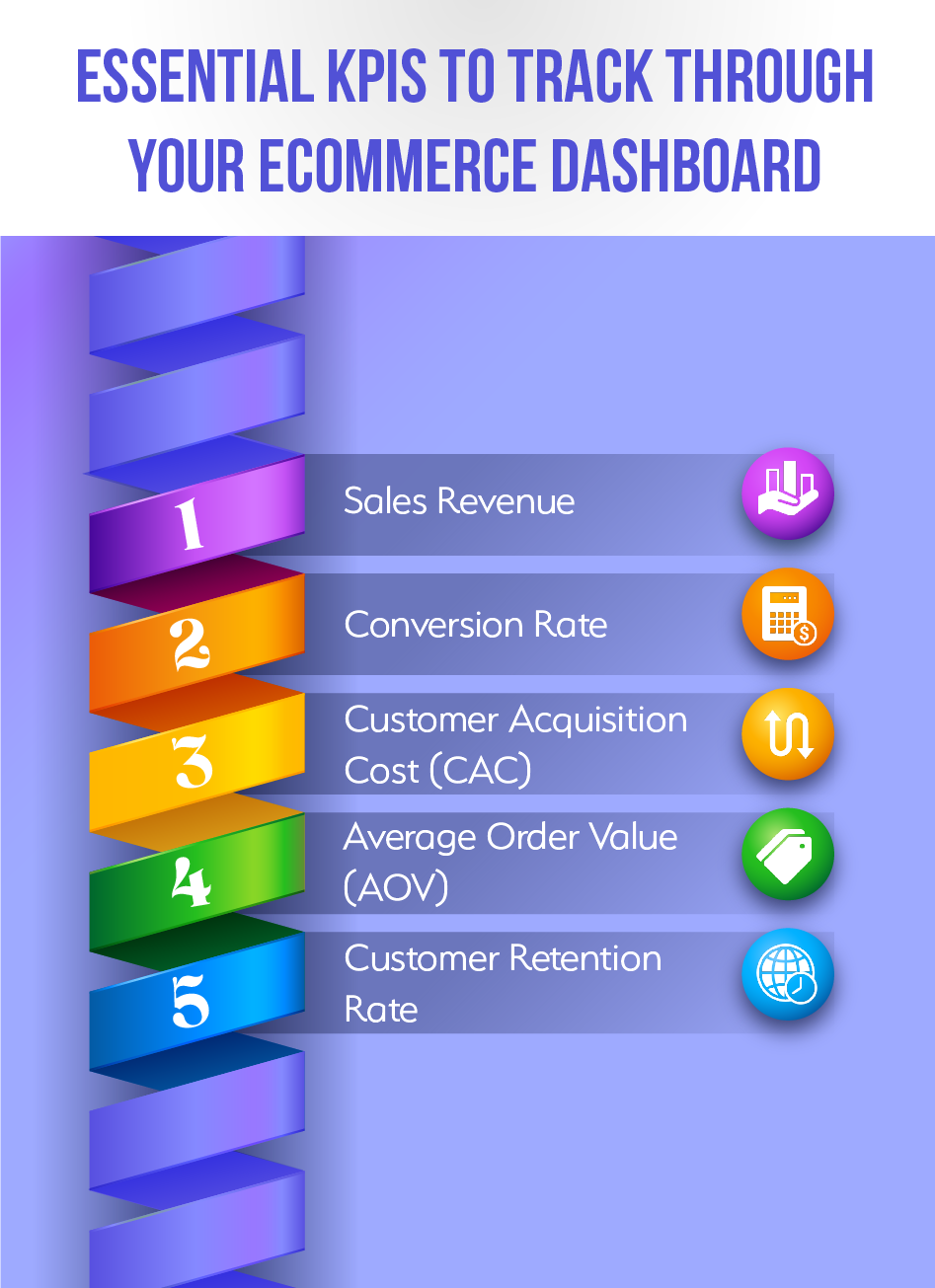Table of Content
Share This Article
- Reading Time: 21 Minutes
- Published: March 26, 2024
- Last Updated: April 9, 2025
Did you know that the global market is expected to reach an impressive $6.310 trillion in 2024? Due to this rise in ecommerce, mastering ecommerce accounting has become a critical necessity. As 90% of Americans are expected to shop online by the end of 2024, the importance of precise financial management for online retailers is at an all-time high. This guide serves as your essential resource, crafted to simplify the intricate financial terrain of ecommerce. From understanding the intricacies of accounting in the ecommerce business to demystifying its complexities, we will provide you with the knowledge and strategies needed to ensure your business remains financially well and competitive in the online marketplace. Through this complete guide on accounting for your business, we will discuss everything you need to know, containing different methods of doing ecommerce accounting, ecommerce accounting strategies, top ecommerce accounting software, ecommerce dashboards, and essential practices for ecommerce accounting.
What is Ecommerce Accounting
Ecommerce accounting is the process of tracking and managing the financial transactions of your online store. It involves keeping a detailed record of all the money that comes in and goes out of your business. This includes tracking sales, expenses, inventory levels, and sales tax. The main goal of ecommerce accounting is to give you a clear picture of your store’s finances. By keeping track of your finances, you can make informed decisions that can help your business grow. For example, you can identify which products are selling well and which ones are not or where you might be spending too much money.
Another important aspect of accounting for ecommerce business is staying compliant with tax laws. By accurately recording your financial transactions, you can ensure that you are paying the correct amount of taxes and avoid any penalties or fines. Accounting for an ecommerce business is a vital part of running a successful online store. It helps you understand your business’s financial situation, make smart decisions, and stay compliant with tax regulations.
How is Ecommerce Accounting Different?
Ecommerce accounting stands out due to several unique factors:
- Transaction Volume:
Ecommerce ventures often deal with a higher volume of transactions compared to brick-and-mortar stores. This is because online stores can reach a wider audience and operate 24/7, leading to more sales and, consequently, more financial transactions to record and manage.
- Source of Transactions:
In ecommerce, transactions come from various sources, including online marketplaces like Amazon, Shopify, and eBay. Each platform has its own payment processing system, which can complicate the accounting process.
- Data Collection and Integration:
Ecommerce accounting requires collecting data from multiple sources, such as online marketplaces, payment gateways, and shipping carriers. Integrating this data into a coherent accounting system is crucial for accurate financial reporting.
- Inventory Management:
Managing inventory is more complex in ecommerce due to the need to track stock levels across multiple sales channels and warehouses. This requires sophisticated inventory management systems that can sync with your accounting software for ecommerce.
- Multi-currency Transactions:
In ecommerce, products are sold internationally, which means dealing with multiple currencies. Accounting for currency fluctuations and conversion rates is an essential part of accounting for the online business.
- Customer Feedback and Interactions:
Online businesses heavily rely on customer feedback and interactions, which can impact financial decisions. For example, high return rates or customer complaints may indicate issues with product quality or pricing, which can affect profitability.
- Technology Integration:
Technology integration in ecommerce accounting is essential, especially the use of accounting software. Using software for ecommerce accounting automates the tracking of sales, payments, and inventory, ensuring accuracy and efficiency. It provides real-time financial insights, crucial for maintaining up-to-date records and making informed decisions.
Ecommerce Accounting VS Ecommerce Bookkeeping
Feature |
Ecommerce Accounting |
Ecommerce Bookkeeping |
| Scope | Broad, encompassing financial analysis, planning, and reporting | Narrow, focused on recording and organizing financial transactions |
| Purpose | Provides insights for strategic decision-making, tax planning, and compliance | Provides precise monitoring of financial transactions for the purpose of ecommerce bookkeeping |
| Skills Required | Requires a deep understanding of financial principles, tax laws, and business strategy | Primarily involves data entry skills and a basic understanding of financial transactions |
| Tools Used | Advanced accounting software with analytical and reporting capabilities | Basic bookkeeping software or spreadsheets for recording ecommerce transactions |
| Impact on Business | Helps in making informed decisions, managing cash flow, and ensuring financial well-being | Supports the accounting process by providing accurate data for financial analysis through ecommerce bookkeeping |
| Frequency of Activity | Involves periodic analysis and reporting, usually monthly, quarterly, or annually | Requires regular updating of records, often daily or weekly |
| Level of Detail | Focuses on summarizing and interpreting financial data for a broader perspective | Concentrates on detailed recording of every financial transaction |
Different Methods of Doing Ecommerce Accounting for Online Business
Ecommerce businesses have several accounting methods to choose from, each with its own advantages and considerations. Here are some common methods of ecommerce accounting for your business:
- Accrual Accounting:
This method records revenues and expenses when they are earned or incurred, regardless of when cash is exchanged. It provides a more accurate picture of finances by matching income with related expenses in the same period. For online businesses, this means recognizing sales when orders are placed, not when payment is received.
- Cash Basis Accounting:
Simpler than accrual accounting, this method records revenues and expenses only when cash is received or paid. While it’s easier to manage, it may not always provide an accurate picture of a business’s financial position. Businesses in ecommerce using this method would record sales only when payment is received.
- Hybrid Accounting:
Some ecommerce businesses use a combination of accrual and cash basis accounting, known as hybrid accounting. This method allows businesses to use accrual accounting for long-term items and cash basis for short-term items, providing flexibility in financial reporting.
- Inventory Accounting Methods:
Online businesses have significant inventory, and how they account for it can impact their financial statements. Common methods include First-In, First-Out (FIFO), where the oldest inventory is sold first, and Last-In, First-Out (LIFO), where the newest inventory is sold first. Another method is the weighted average cost method, which calculates the cost of inventory based on the average cost of all items.
- Revenue Recognition:
Ecommerce businesses must decide when to recognize revenue. The point of sale is a common method, where revenue is recognized when a customer makes a purchase. Another method is upon delivery, where revenue is recognized when the customer receives the product.
Each ecommerce accounting method has its pros and cons, and the right choice depends on the specific needs and circumstances of the business. It’s important to consult with a financial professional to determine the most appropriate method for accurate and compliant financial reporting.
How to Get Started with Ecommerce Accounting?
Getting started with ecommerce accounting for your online business in the USA involves several important steps to ensure financial clarity and compliance:
- Obtain a Business Tax ID Number:
If you’re running a partnership or corporation, you’ll need to get an Employer Identification Number (EIN) from the IRS. This unique nine-digit number is essential for identifying your business in tax documents, opening business bank accounts, hiring employees, establishing credit, obtaining permits, and ensuring compliance with IRS audit requirements. If you are a sole proprietor, you can use your Social Security Number (SSN) instead.
- Open a Dedicated Business Bank Account:
Set up a separate business bank account to avoid mixing personal and business finances. This will make it easier to manage your finances and simplify tax reporting. Consider options like PayPal for Business or Shopify Balance for quick setup.
- Choose the Right Accounting Software:
While you might start with Excel or Google Sheets, investing in ecommerce accounting software like Xero or QuickBooks Online can save time as your business grows. These tools help track sales, expenses, inventory, and taxes, and they generate essential financial reports.
- Set Up a Bookkeeping System:
Decide whether you’ll handle bookkeeping in-house or outsource it to a professional. A good bookkeeping system will help you keep track of all financial transactions, including sales, purchases, and expenses.
- Understand Ecommerce Tax Obligations:
Familiarize yourself with sales tax requirements for ecommerce businesses in the USA. You may need to collect and remit sales tax in the USA for online sales, depending on your state’s laws and your business’s nexus.
- Develop a System for Tracking Inventory:
Effective inventory management is crucial for ecommerce. Your accounting software should integrate with your inventory system to provide real-time updates on stock levels and cost of goods sold (COGS).
- Regularly Review Financial Reports:
Make it a habit to review your financial statements, such as the income statement, balance sheet, and cash flow statement. This will help you make informed decisions and keep your business on track financially.
By following these steps and maintaining good financial practices, you’ll be well on your way to successful ecommerce accounting for your online business in the USA.
Common Ecommerce Accounting Mistakes to Avoid
Managing your ecommerce accounting can be tricky, but avoiding common mistakes in accounting can save you a lot of headaches down the road. Here are some pitfalls to watch out for:
- Mixing Personal and Business Finances:
As we mentioned earlier, it’s crucial to keep your personal and business finances separate. Using a dedicated business bank account will help you stay organized and make tax time less stressful.
- Incorrect Calculation of COGS (Cost of Goods Sold):
Accurately calculating your COGS is essential for understanding your business’s profitability. Make sure you include all direct costs associated with producing your products, such as materials and labor.
- Not Staying Tax Compliant:
Ecommerce businesses often have complex tax obligations, especially if you sell in multiple states or countries. Stay on top of your tax requirements to avoid penalties and fines.
- Putting Off Bookkeeping Until Tax Time:
Regular bookkeeping is crucial for maintaining accurate financial records. Don’t wait until tax season to get your books in order. Instead, update your records regularly to avoid last-minute stress.
- Incorrect Inventory Levels:
Keeping accurate track of your inventory ensures order fulfilment and financial planning. Regularly check your inventory levels to avoid stockouts or overstocking, which can impact your cash flow.
- Not Reviewing Financial Reports
Failing to review financial reports is a common mistake in ecommerce accounting. Regularly checking these reports is crucial for understanding your business’s financial health. Ignoring them can lead to overlooked errors, missed opportunities for improvement, and poor decision-making.
- Overlooking the Importance of Cash Flow Forecasting:
Understanding the flow of your cash is key to making informed business decisions. Regularly forecast your cash flow to ensure you have enough funds to cover expenses and invest in growth opportunities.
Why is cash flow forecasting important for ecommerce businesses?
Cash flow forecasting is vital in an ecommerce business for several reasons:
- Managing Sales Volatility:
Businesses experience rapid sales changes due to promotions, new product launches, and seasonal trends. Cash flow forecasting helps these businesses anticipate and prepare for such fluctuations, ensuring they have the resources to capitalize on opportunities or weather downturns.
- Inventory Control:
Proper inventory control helps ecommerce businesses decide how much inventory to keep. It prevents having too much stock, which costs money to store, and too little stock, which can lead to missed sales opportunities.
- Marketing Strategy:
For ecommerce businesses, digital marketing is crucial for driving sales. Forecasting helps allocate a marketing budget effectively, ensuring that funds are available for essential campaigns and promotions.
- Operational Efficiency:
As a business grows, it may need to invest in new technology, hire additional staff, or expand its warehousing. Cash flow forecasting aids in planning these operational changes, ensuring that investments are made at the right time.
- Expansion and Growth:
An online business must reinvest its profits wisely for sustainable growth. A clear cash flow forecast helps identify the best opportunities for reinvestment and supports long-term success.
- Risk Mitigation:
Forecasting helps ecommerce businesses identify potential financial shortfalls in advance. By analyzing patterns in sales, expenses, and other financial metrics, businesses can estimate their future revenue, costs, profitability, and risk.
- Strategic Decision-Making:
An ecommerce accountant can use cash flow forecasting to provide insights into the financial data of the business. This information is crucial for making strategic decisions that affect the company’s future.
How to Create a Cash Flow Forecast for Your Ecommerce Business
Creating a cash flow forecast for your ecommerce venture is a crucial step in ensuring financial stability and planning for future growth. Here’s a step-by-step guide to help you develop an effective cash flow forecast:
- Decide the Forecasting Horizon:
Determine the time frame for your cash flow forecast. For ecommerce businesses, a monthly forecast for the next 12 months is common, but you can adjust this based on your specific needs and the level of volatility in your industry.
- List Your Expected Income:
Start by estimating your expected income. For an ecommerce business, this will primarily include revenue from sales. Consider historical sales data, seasonal trends, and any planned promotions or marketing campaigns that might impact your sales.
- List Your Expected Outgoings:
Itemize all your expected expenses. This includes fixed costs such as rent, salaries, and subscriptions, as well as variable costs like shipping, inventory purchases, and marketing expenses. Don’t forget to account for any one-time expenditures or upcoming investments.
- Work Out Your Running Cash Flow:
Calculate your running cash flow by subtracting your total expected outgoings from your total expected income for each period. This will give you a snapshot of your net cash flow, loan repayments, taxes payments that will help you identify any potential shortfalls or surpluses.
- Adjust for Seasonality and Trends:
Ecommerce businesses sometimes experience significant fluctuations due to seasonality and changing consumer trends. Adjust your forecast accordingly to ensure it remains realistic and useful.
- Monitor and Update Regularly:
Your cash flow forecast is a living document. Regularly review and update it based on actual performance and any changes in your business environment. This will help you stay on top of your financial situation and make informed decisions.
Important Financial Reports to Track for Your Ecommerce Business
Monitoring financial reports is a big step for effective accounting for ecommerce businesses. Here are some important financial reports that are helpful to track business finances and budgeting:
- Income Statement (Profit and Loss Statement):
This report summarizes your revenues, expenses, and profits over a specific period, showing your business’s profitability.
- Balance Sheet:
This snapshot of your company’s financial position lists assets, liabilities, and equity, helping you understand your business’s net worth.
- Cash Flow Statement:
This report tracks the flow of cash in and out of your business, highlighting your company’s liquidity and ability to cover expenses.
- Accounts Receivable Aging Report:
This report shows outstanding customer invoices and their aging, helping you manage collections and assess credit risk.
- Inventory Management Reports:
These reports provide details on stock levels, turnover rates, and order quantities, crucial for optimizing inventory and reducing costs.
- Sales Tax Report:
This report summarizes the sales tax collected and owed, ensuring compliance with tax regulations.
- Cost of Goods Sold (COGS) Report:
This report calculates the direct costs associated with producing your products, essential for pricing strategies and profitability analysis.
- Gross Margin Report:
This report shows the difference between revenue and COGS, providing insights into your business’s profitability and pricing strategies.
- Budget vs. Actuals Report:
This report compares your budgeted figures with actual results, helping you monitor financial performance and adjust plans as needed.
- Accounts Payable Report:
Accounts payable reports are essential for monitoring your business’s cash outflows. They offer a clear view of pending bills, due dates, and supplier interactions, enabling effective cash flow management and ensuring prompt payment to vendors.
Tracking these financial reports provides valuable insights into the business. Ecommerce KPIs and key metrics for ecommerce, such as CLV, COGS, and gross margin, are crucial for making data-driven decisions and driving growth. Regularly reviewing these reports ensures you stay informed and proactive in managing your ecommerce business.
Top Strategies for Efficient Ecommerce Accounting
Here are some savvy strategies that an ecommerce accountant should follow to keep the accounting game strong:
- Bookkeeping Brilliance:
Keeping your books tidy is the secret sauce to financial clarity. It’s all about staying organized.
- Workflow Clarity:
Crafting a clear workflow is like setting up a roadmap for your finances. It keeps everything running smoothly.
- Chart of Accounts:
Picking the right chart of accounts is like choosing the right ingredients for a recipe. It makes all the difference.
- Income and Expense Insight:
Tracking your money is crucial. It’s like having a financial GPS to guide your business decisions.
- Reconciliation Routine:
A regular accounts reconciliation is like giving your finances a regular health check. It keeps everything in order.
- Inventory Intelligence:
Selecting the right inventory management system is like finding the perfect puzzle piece. It just fits.
- Cash Flow Clarity:
Keeping an eye on your cash flow is like watching your business’s heartbeat. It’s essential for keeping it alive and kicking.
- Tax Tactfulness:
Understanding taxes can feel like a maze, but getting it right can lead to big savings. It’s worth the effort.
- Month-End Mastery:
Efficient month-end closing sets you up for success in the new month. It’s like hitting the refresh button.
- Automation Advantage:
Embracing automation for accounting is like having a secret weapon. It saves time and reduces errors.
What is an Ecommerce Dashboard?
An eCommerce dashboard is a powerful tool that provides a visual representation of ecommerce KPIs and metrics related to an online store’s operations. It consolidates data from various sources, such as sales, website traffic, customer behavior, and inventory levels, into a single, easy-to-understand interface. This enables eCommerce business owners and managers to monitor their store’s performance in real-time, make data-driven decisions, and identify trends and opportunities for growth. By offering a comprehensive overview of the business’s health, an eCommerce dashboard is an essential component for effective eCommerce accounting and strategy development.
How to Set up an Ecommerce Dashboard?
Here’s how to set up an eCommerce dashboard:
- Set Your Dashboard Objectives:
Determine what you want to achieve with your dashboard. This could include tracking sales performance, monitoring customer behavior, or assessing marketing campaign effectiveness.
- Identify the Metrics and KPIs to Track:
Choose the ecommerce KPIs and metrics that align with your objectives. Common eCommerce metrics include conversion rate, average order value, customer acquisition cost, and cart abandonment rate.
- Choose Your eCommerce Data Sources:
Identify where your data will come from. This might include your eCommerce platform, Google Analytics, social media analytics, and other relevant sources.
- Choose a Data Management or Dashboard Platform:
Select a platform that can integrate your data sources and provide the tools to create and customize your dashboard. Popular options include Google Data Studio, Tableau, and Microsoft Power BI.
- Implement Your Data Collection Plan:
Set up the necessary integrations and connections to ensure your data is being collected accurately and consistently.
- Clean and Optimize Your Data:
Ensure your data is accurate and relevant. Remove any duplicates, correct errors, and organize your data for easy analysis.
- Build Your Data Visualizations:
Create charts, graphs, and other visualizations that effectively communicate your KPIs and metrics. Customize these visualizations to make them intuitive and actionable.
- Share Your Dashboard with Data Stakeholders:
Provide access to your dashboard to relevant stakeholders, such as team members, executives, or investors, so they can make informed decisions based on the data.
Top 4 Accounting Software for Ecommerce Business
Here are four top-notch ecommerce accounting software options that every ecommerce accountant should consider:
- Comprehensive Reports: Get detailed insights into your financial health with a wide range of reports.
- Inventory Tracking: Keep a close eye on your stock levels and cost of goods sold.
- Seamless Integration: Connects easily with popular ecommerce platforms and payment processors.
- Scalable Solutions: Offers different plans to suit businesses of all sizes, from startups to established enterprises.
- Automated Workflows: Streamline your ecommerce accounting processes with customizable automation.
- Client Portal: This allows customers to view their transactions and make payments online.
- Multi-currency Support: Manage transactions in multiple currencies with ease.
- Time Tracking: Keep track of billable hours and expenses for service-based ecommerce businesses.
- Real-time Financial Overview: Get a live view of your cash flow and financial performance.
- Easy Invoicing: Create and send professional invoices with options for online payment.
- Bank Reconciliation: Automatically import and categorize bank transactions.
- Collaboration Tools: Work closely with your team and advisors with shared access to financial data.
- Unified Business Management: Combines ERP, CRM, and ecommerce capabilities in one platform.
- Global Commerce Support: Manage multiple subsidiaries, currencies, and tax regulations.
- Advanced Inventory Management: Handle complex inventory challenges with effective tools.
- Customizable Dashboards: Personalize your interface to focus on key metrics and performance indicators.
Role of an Accountant and Bookkeeper in Ecommerce Business
The role of an ecommerce accountant or bookkeeper in accounting for your business is important for ensuring financial accuracy and compliance. These professionals are responsible for managing and overseeing the financial aspects of an online retail operation, which can be complex due to the digital nature of transactions and the global reach of ecommerce.
An ecommerce accountant or ecommerce bookkeeper typically handles tasks such as recording sales and expenses, reconciling bank and payment gateway statements, and managing inventory accounting. They ensure that all financial transactions are accurately captured in the accounting system, which is crucial for maintaining up-to-date financial records. In addition to these core responsibilities, an ecommerce CPA also plays a key role in tax preparation and compliance. They assist in calculating and filing sales tax, VAT, or GST, depending on the geographical location of the business and its customers. This is particularly important in ecommerce, where transactions often cross state or national boundaries.
An ecommerce accountant provides valuable insights into the finances of the business. They analyze financial data to identify trends, monitor cash flow, and provide recommendations for cost reduction and profit maximization. The expertise of an ecommerce business accountant helps business owners make informed decisions and strategize for growth.
Is Outsourcing Your E-commerce Accounting a Good Idea?
Outsourcing accounting for an ecommerce business to an ecommerce CPA can be a smart decision, offering several advantages that can contribute to the success and growth of your online store.
- Expertise and Specialization:
By outsourcing to a specialized ecommerce accountant, you gain access to a professional with a deep understanding of the unique financial challenges and opportunities in the ecommerce sector. They can provide valuable insights and advice tailored to your business needs.
- Cost-Efficiency:
Outsourcing can be more cost-effective than hiring a full-time in-house ecommerce accountant. You can save on salary, benefits, and overhead costs associated with employing staff. Additionally, you only pay for the services you need, allowing for better control over your expenses.
- Focus on Core Business Activities:
Outsourcing your ecommerce accounting allows you to concentrate on your core competencies, such as product development, marketing, and customer service. By delegating financial tasks to experts, you can allocate more time and resources to growing your business.
- Scalability and Flexibility:
As your ecommerce business grows, your accounting needs will change. An outsourced accounting service can easily adapt to your evolving requirements, providing scalable solutions that can expand or contract as needed.
Outsourcing your ecommerce accounting can provide expertise and cost-efficiency and allow you to focus on your core business activities, all while offering scalability and flexibility. It’s a strategic choice that can support the growth and success of your ecommerce business.
How to Find the Right Ecommerce Accountant for Your Business?
Finding the right firm to outsource ecommerce accounting services in California and other states of the USA requires careful consideration because the laws are different in each state. Here are some steps to guide you.:
- Specialization:
Look for a firm that specializes in ecommerce accounting. They should have a deep understanding of the unique challenges and opportunities in the online retail space.
- Experience:
Choose a firm with a proven track record of working with ecommerce businesses. Ask for references or case studies to assess their expertise.
- Technology:
Ensure the firm is proficient in using modern ecommerce accounting software and tools that integrate seamlessly with your ecommerce platform.
- Communication:
Good communication is crucial. Select a firm that is responsive and willing to explain complex financial concepts in simple terms.
- Scalability:
Consider whether the firm can accommodate your business’s growth and changing needs over time.
- Cost:
Compare pricing structures, but remember that the cheapest option may not always provide the best value.
As mentioned above, finding the right firm to outsource ecommerce accounting services in San Diego, New York, or anywhere in the USA requires focusing on specialization, experience, technology, communication, scalability, and cost for optimal financial management.
Final Word
It is clear that ecommerce accounting is not similar to usual accounting. It demands a different approach that addresses the distinct challenges and prospects of online commerce. From handling a high volume of transactions and dealing with multiple currencies to leveraging technology for seamless integration and maintaining precise inventory records, ecommerce accounting is one that necessitates accuracy and expertise. By employing suitable accounting methods and steering clear of common pitfalls, businesses can lay down a strong financial framework. The significance of cash flow forecasting, maintaining accurate financial records, and implementing effective accounting strategies can never be exaggerated, as these are vital for avoiding uncertainties and fostering sustainable growth. It is crucial for businesses to stay ahead of developments and adapt to the demands of ecommerce finance. Accounting for ecommerce business serves as a strategic instrument that empowers informed decision-making and contributes to the growth of your online venture.

Get customized plan that supports your growth

Thousands of business owners trust Whiz to manage their account
Let us take care of your books and make this financial year a good one.
















